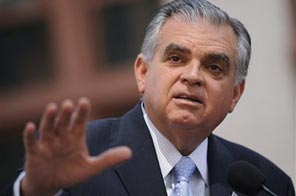SPIN METER: $3 billion buys not-so-green vehicles
WASHINGTON: Transportation Secretary Ray LaHood, the nation's top car salesman in recent weeks, has cited the Obama administration's best-seller list of mostly smaller, fuel-saving cars like the Ford Focus to describe the success of the Cash for Clunkers rebate program.
But what LaHood and other administration officials usually don't mention is that some trucks and sport-utility vehicles that get less than 20 miles per gallon, like the Ford F-150 truck and one version of the Cadillac SRX Crossover, also are being purchased with the new government subsidies. Both are bulky vehicles weighing more than 6,000 pounds when loaded that boast at least 248 horsepower.
Just how many consumers used the federal rebates to buy these larger, not-so-green vehicles is unclear. The Obama administration has declined so far to release detailed records of purchases under the program being compiled by the Transportation Department, listing every clunker deal requesting rebates. The Associated Press requested the data July 31.
The Transportation Department distributes regular summaries of sales from the clunkers program and has used the electronic sales information from dealers to bolster arguments that Americans are dumping gas guzzlers for gas savers. But its failure to release detailed records means the public can't verify those claims.
"Today almost 200,000 new fuel-efficient automobiles averaging 25 miles per gallon are on the road instead of gas-guzzling trucks and SUVs," LaHood wrote on his official blog just before Congress voted to spend $2 billion more for the government rebates last week.
Even the Top 10 list of mostly smaller, fuel-efficient cars that LaHood has cited as evidence of the program's success is being questioned. A different Top 10 sales list produced by Edmunds.com, an auto consumer Web site, from dealer sales data shows fewer small cars and more large vehicles like trucks and utility vehicles make up the best sellers.
Both lists of top sellers include, for example, the fuel-saving Toyota Corolla, and the clunkers program by its definition is encouraging consumers to dump older, less fuel-efficient cars for new, more efficient models.
But the program, now expanded to $3 billion and offering rebates of up to $4,500, isn't limited to the best gas savers on the market. And that's good news to Beny Ledesma, general sales manager at Williamson Cadillac-Hummer in Miami.
The dealership has sold three 2009 Cadillac SRXs- the six-cylinder engine model through the clunkers program, he said, and is finishing paperwork on two more. Ledesma hopes to sell the other 14 at the dealership, along with some of the Hummer H3Ts on the lot that are eligible for clunker rebates.
Both vehicles get about 18 mpg, considerably less than the 25.3 mpg average that LaHood has attributed to new cars purchased under the clunker program.
"The Cash for Clunkers is definitely generating traffic for Cadillac and Hummer," Ledesma said.
It's not just Honda Civics and Toyota Priuses, two cars that get as much as 29 mpg and 50 mpg respectively, that people can buy with the $3 billion in government rebates. They can also buy versions of the 2009 Lexus RX 350 or 2009 Lincoln MKX, both pricey five-passenger utility vehicles that get about 19 mpg and are capable of towing a small boat.
Buyers must have trade-ins that qualify for such deals comparable vehicle types with at least 2 mpg less in fuel efficiency than the new purchase. And the new vehicle can't cost more than $45,000.
Even a high-end 2009 BMW X3 crossover utility vehicle, priced at just under $40,000, counts as a gas saver eligible under the government program, with 19 mpg.
White House spokeswoman Jen Psaki said the administration is reviewing the AP's request for the clunkers transaction data that would show all cars purchased and traded under the program, and their fuel efficiency ratings. She said new vehicles purchased are raising the average fuel economy of cars and trucks on the nation's highways and "getting the dirtiest and most polluting vehicles off the road."
Dealers have submitted requests for rebates on 292,447 vehicles sold, at a cost of about $1.2 billion to the government, according to sales data summarized by Transportation Department officials.
It shouldn't come as a surprise that less fuel-efficient vehicles are being purchased with clunker rebates, said Lena Pons of the watchdog group Public Citizen. Congress agreed to loosen fuel efficiency requirements under the program when it passed the initial legislation earlier this year.
Pons said Public Citizen also is seeking sales data from the program to determine whether it has led to drivers replacing larger trucks with smaller cars, or whether vehicles purchased under the program are only marginally better in fuel efficiency.






